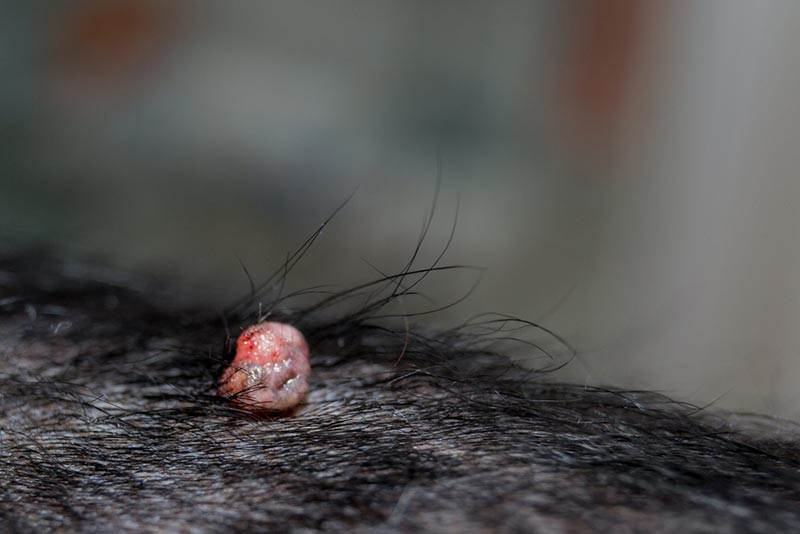My Dog Ate an Edible: Here’s What to Do (Vet Answer)

Updated on

Click to Skip Ahead
It can be a scary time for owners when their dogs eat something they shouldn’t. If your dog has eaten an edible containing cannabis, you must contact your vet immediately as a matter of urgency. Cannabis is toxic to dogs. This article will advise exactly what to do in this situation and the best way to keep your dog safe and potentially save their life.
Edible cannabis products, (also known as edibles) are products containing cannabinoids that are designed for humans to eat or drink. Cannabinoids are chemicals that are found in cannabis products. They affect the brain and the body when they are consumed.
Dogs can be poisoned by cannabis products in many different ways, and it is very common for them to ingest edibles containing cannabis. The psychoactive chemical tetrahydrocannabinol, (THC for short) is the main toxic component of cannabis for dogs.
Depending on the amount eaten, your dog may quickly become ill. Read this vet-written guide to find out exactly what to do if your dog eats an edible.
What are Edibles?
Edibles are cannabis (or marijuana) products that contain cannabinoids which you can consume by eating or drinking. Cannabinoids are the chemical compounds responsible for the reported effects on the mind and the body when eaten drunk or smoked.
Cannabis refers to the part of the cannabis plant that has been dried. Cannabis is widely used for its medicinal properties, however, lots of people use it for recreational purposes too.
Cannabis contains lots of different cannabinoids, but THC is one of the more well-known ones due to its psychoactive effects. Another well-known compound is cannabidiol (CBD) which lots of people use for medicinal purposes.
Due to misuse and abuse of the drug, cannabis has been criminalized for decades. Some states in the US have since legalized it for medicinal and/or recreational use. The increase in availability of the drug has led to an increase in accidental ingestion by dogs.
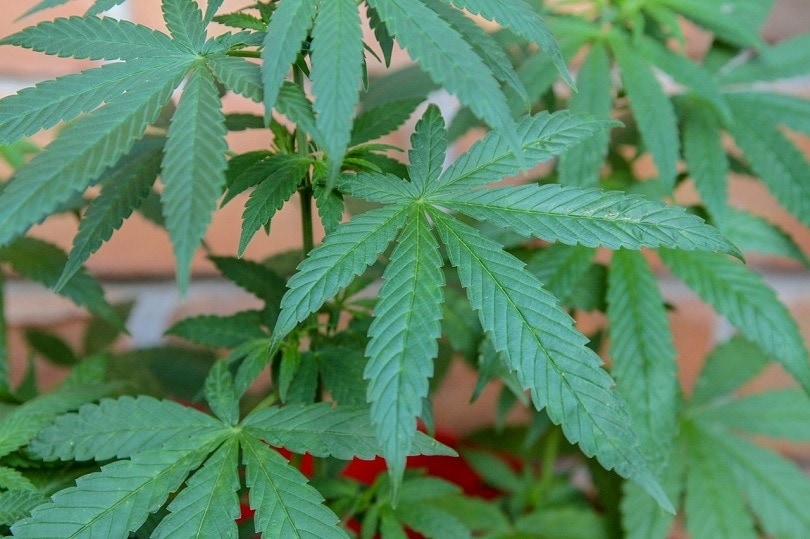
What are the Dangers of Edibles for Dogs?
There are a few issues with the consumption of edibles by dogs. The main one is that the psychoactive compound THC is very toxic to dogs. Dogs have cannabinoid receptors in their brain, the same as humans, however, dogs recycle cannabinoids, so this means even a tiny amount can be extremely toxic to them. If your dog ingests THC, it is absorbed by the gut and stored in bile. When your dog next eats, the bile with THC in gets secreted into the intestines. This causes more exposure and explains why dogs’ symptoms are generally much worse than humans.
In addition to this, often edibles contain chocolate, raisins, or xylitol which are all extremely toxic to dogs. These can cause severe poisoning depending on the amount ingested so it is dangerous if your dog eats any products like these. The effects of THC toxicity depend on the amount ingested and the size and shape of the dog.
The 5 Steps to Do If Your Dog Has Eaten an Edible
1. Prevent your dog from eating any more edibles.
If you catch your dog chewing an edible, remove the edible from your dog’s mouth, if it is safe to do so. If they have got into a bag, check how many are left and take them away from your dog. Ensure they do not have access to it anymore. If you are out on a walk, leave the area they found the edible in.

2. Report the incident
Your next action will be to call your vet straight away to report the incident. Make sure your dog is supervised while you are on the phone. You can also report the incident to the ASPCA Animal Poison Control Center at (888) 426-4435. They are open 24 hours a day and they will be able to give advice. They are very likely to advise you to go straight to your vet, so it may be wise to call your vet first.
Your vet will need to ask you some questions to gain as much information as possible.
Be prepared to answer questions such as:
- How much or how many edibles did your dog eat?
- What was on the list of ingredients, if available?
- What time was the edible eaten?
- What breed is your dog?
- How old is your dog?
- How big is your dog?
- What does your dog weigh?
- Does your dog have any health issues already present?
- Is your dog showing any signs of illness currently?
The more information you give your vet, the more they will be able to help your dog.
3. Save a sample of the edible.
If there is any left, or any more of the product in the packaging, bring this with you to your vet. Some edibles do have a list of ingredients on their packet which is extremely useful for your vet to be aware of when trying to treat your dog.
Your vet will be interested in the amount of THC in the product, and also if the product contains any substances such as xylitol which is an artificial sweetener that is toxic to dogs as well. Chocolate and raisins are toxic as well.
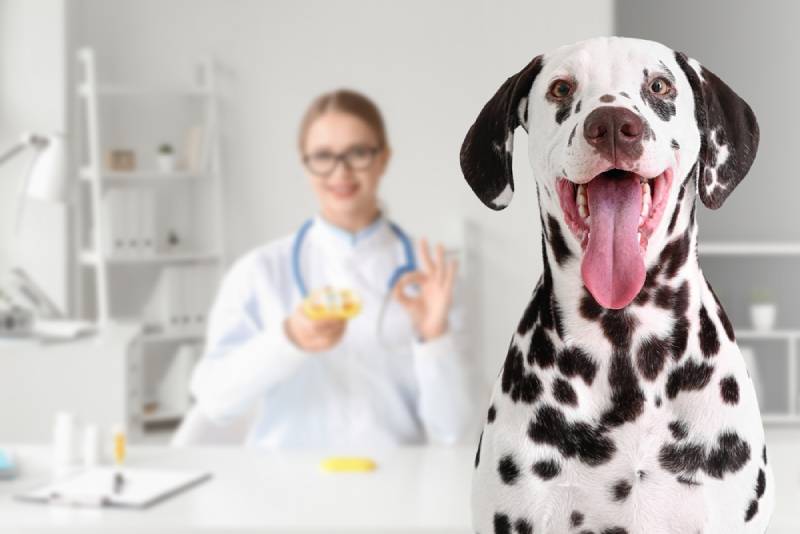
4. Follow your vet’s instructions
Based on the information you have given your vet; they will advise you what you need to do next. They will likely ask you to come straight down to the hospital. If this is the case, you need to get there as quickly and safely as possible.
5. Supervise your dog
Do not let your dog out of your sight when you are speaking to the vet on the phone, or when you are preparing to leave for the vet. Depending on how much edible was eaten, your dog could start showing signs as quickly as 30 minutes after ingestion. You need to monitor your dog closely and make sure they are safe. It is also important to ensure they do not try to run off or escape as this will delay or prevent treatment of your dog.

How Do Dogs Usually Get Access to Cannabis?
By far the most common cause of cannabis toxicity is dogs eating edibles such as gummies, brownies, cookies, or muffins. They can also be exposed by inhalation when the product is smoked, or by ingestion of oils but these are much less common. The reason dogs often eat edibles is because they are usually made with something that smells enticing for dogs such as a sweet treat containing chocolate. It is so important to always keep these sorts of products locked in a safe container where your dog will not be able to access them. Never feed them to your dog and if you smoke, do not do so near any animals.
Signs Your Dog Has Eaten an Edible
Similar to humans, each dog will react differently to cannabis. Some dogs will tolerate it well, others will have a bad reaction. Dogs have a lot more cannabinoid receptors than humans do, so cannabis is very toxic to them. This also means dogs are susceptible to the effects.
If you know your dog has eaten edibles, or you are suspicious that they have, it is very important to monitor their behavior to determine if they are having an adverse reaction. Dogs with cannabis toxicity will often show the following signs:
- Lethargy
- Drowsiness
- Loss of control of the bladder
- Dilated pupils
- Hypersalivation
- Slow heartbeat
- More reactive to noise
- Tremors
- Vomiting
- Depression
- Agitation
- Unstable on legs
- Difficulty regulating body temperature
- Sedation
- Vocalization
Clinical signs may last for a long time. This is partly due to the fact that THC compound is stored in fat cells in the body, and it can take days to break it down. Signs can appear from 30 minutes after ingestion and last for days.
Diagnosis of Cannabis Toxicity
Usually, owners will be able to tell their vet that their dog has eaten one of their edibles. Your vet will be able to use this information, along with any clinical signs to make the diagnosis. There are some tests available that measure the amount of THC in the urine, however, they take a while to give results, so are not often used as they are not practical.
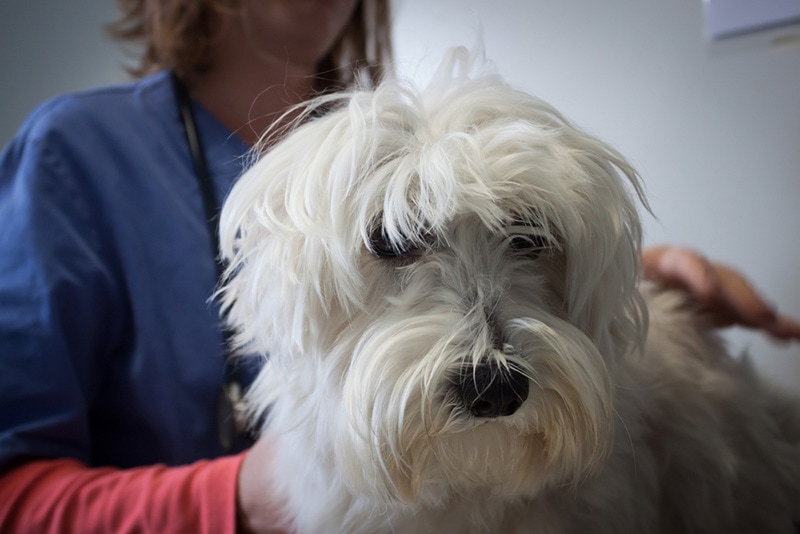
Treatment of Cannabis Toxicity
There is no direct antidote for cannabis poisoning. However, there are a few different things your vet will do depending on the time frame and amount ingested.
If your dog is brought to the vet within 2 hours, then your vet may attempt to induce vomiting. A lot of the time the toxicity isn’t apparent until a while after ingestion, and the owner may not have seen the dog eat the edible, so often this is not appropriate. In severe cases, your vet can perform gastric lavage to empty the contents of the stomach. Activated charcoal can be used to attempt to neutralize the toxin. Enemas can also be given to attempt to reduce toxin absorption from the gastrointestinal tract.
If the dog has ingested the edible a while ago, your vet will initiate supportive care.
Your dog is likely to have intravenous fluid therapy administered to help them stay hydrated and maintain electrolyte levels. If they are vomiting, your vet can give antiemetic drugs. Your dog’s heart rate and temperature will be monitored regularly to ensure they are not too hot or too cold. They will be put in a large spacious kennel with padding and comfortable bedding so that it is less likely that they injure themselves if they are unsteady on their feet.
Usually, dogs respond very well to supportive care, as long as the problem is identified quickly, and treatment is given promptly. The issue veterinarians have is when they are given an incomplete history as owners do not want to admit they had edibles in the house or that their dog has been exposed to them in some other scenario. It is vital that owners understand the vet is only interested in the clinical history so that they can treat your dog appropriately.
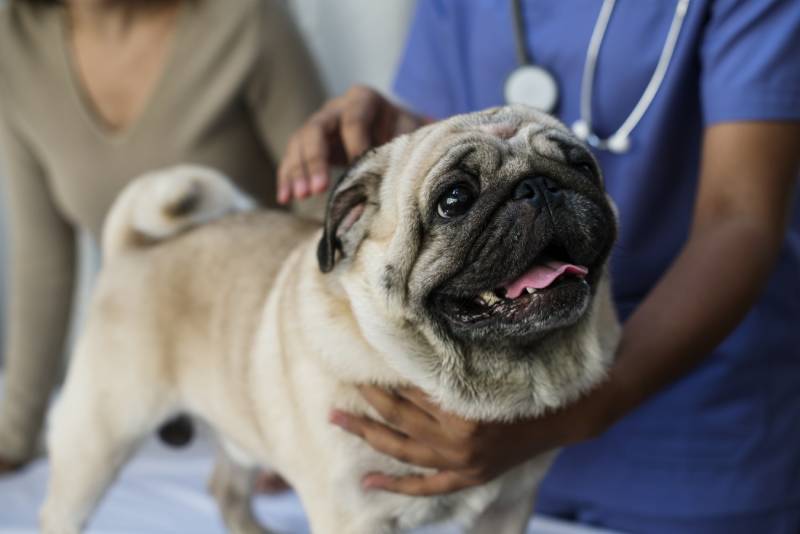
Conclusion
Ingestion of edibles is getting to be more commonly seen in dogs. Edibles not only contain toxic compounds such as THC but possibly also other toxic substances such as chocolate, xylitol, and raisins.
If you think your dog may have ingested any sort of edibles, get in contact with your vet immediately. On most occasions, with prompt treatment, dogs have a good prognosis.
Always ensure you keep any products containing cannabis locked away from your dog and only ever use what you are legally permitted to.
See also:
- My Dog Ate My AirPods: Here’s What to Do (Vet Answer)
- My Dog Ate a Cockroach: Here’s What to Do (Vet-Reviewed)
Featured Image Credit: Bukhta Yurii, Shutterstock




